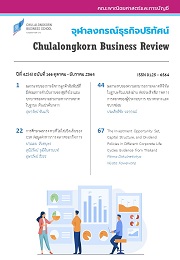The Impact of Customer Relationship Management on Hotel performance: The Mediating Effect of Marketing Capability
Main Article Content
Abstract
The purpose of this research is to determine the effect of customer relationship management on the hotel performance in Thailand. Data were collected from 109 hotel businesses in Thailand by using questionnaire as a research tool. The descriptive statistics were used to analyze the obtained data and the correlation analysis and multiple regression were also employed to test hypotheses. Clearly, statistic results showed that customer relationship management in terms of customer relationship management organization, technology based relationship management, and knowledge management had a positive effect on hotel performance and marketing capability. The results also revealed that marketing capability exhibited a positive effect on hotel performance as a mediating variable accentuating the relationship between customer relationship management and hotel performance. This research expands the resource based theory and contributes to the literature on customer relationship management by suggesting that stronger customer relationship management should be reflected in higher marketing capability and therefore enhances stronger hotel’s performance. The study also suggests the process of two-way communication in customer relationship management which enhances hotel business to understand the customer wants, create specific targets, involve in the development of action plan, and develop outstanding service standard as well as create more professional staff. Moreover, modern technological systems should be applied to generate suitable marketing strategies in hotel business.
Article Details
Opinions and discussions in papers published by the Creative Business and Sustainability Journal (CBSJ) are deemed as personal opinions and the responsibility of the writers. They are not the opinions or responsibility of the Chulalongkorn Business School of Chulalongkorn University.
Papers, content, information etc. appearing in the Journal are deemed to be the copyright property of the Chulalongkorn Business School of Chulalongkorn University. Anybody or any organization that wishes to publish any part of them or use them in any way must obtain written permission from the Chulalongkorn Business School, Chulalongkorn University.


